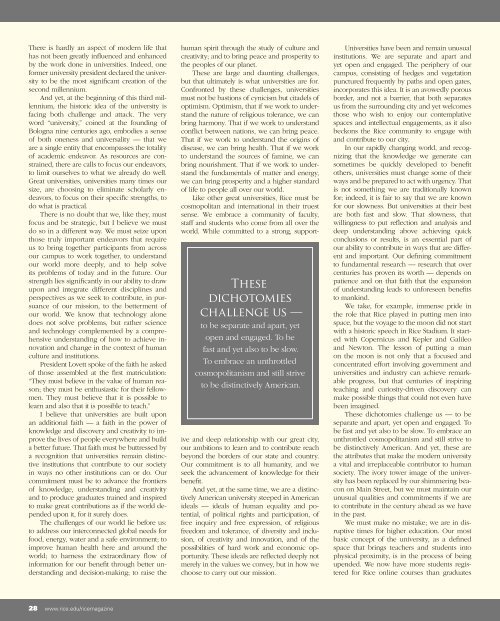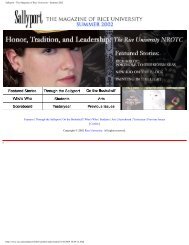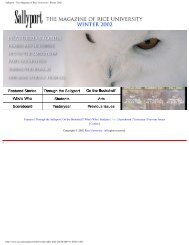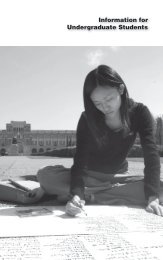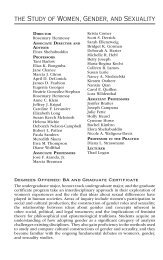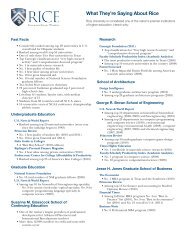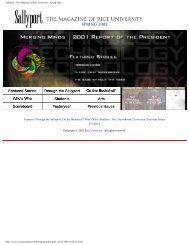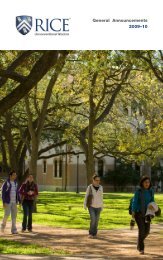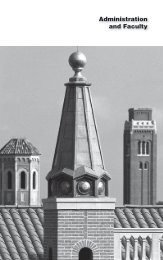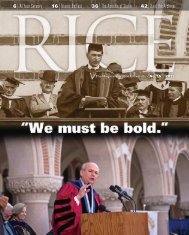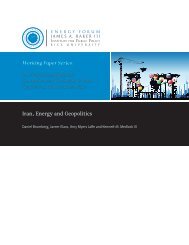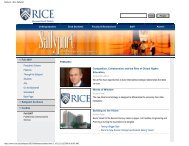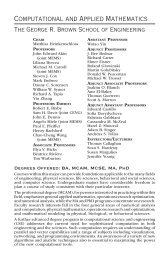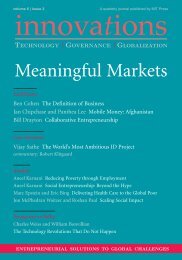6| At Your Servery ⢠16|Titanic Belfast ⢠36|The ... - Rice University
6| At Your Servery ⢠16|Titanic Belfast ⢠36|The ... - Rice University
6| At Your Servery ⢠16|Titanic Belfast ⢠36|The ... - Rice University
You also want an ePaper? Increase the reach of your titles
YUMPU automatically turns print PDFs into web optimized ePapers that Google loves.
There is hardly an aspect of modern life that<br />
has not been greatly influenced and enhanced<br />
by the work done in universities. Indeed, one<br />
former university president declared the university<br />
to be the most significant creation of the<br />
second millennium.<br />
And yet, at the beginning of this third millennium,<br />
the historic idea of the university is<br />
facing both challenge and attack. The very<br />
word “university,” coined at the founding of<br />
Bologna nine centuries ago, embodies a sense<br />
of both oneness and universality — that we<br />
are a single entity that encompasses the totality<br />
of academic endeavor. As resources are constrained,<br />
there are calls to focus our endeavors,<br />
to limit ourselves to what we already do well.<br />
Great universities, universities many times our<br />
size, are choosing to eliminate scholarly endeavors,<br />
to focus on their specific strengths, to<br />
do what is practical.<br />
There is no doubt that we, like they, must<br />
focus and be strategic, but I believe we must<br />
do so in a different way. We must seize upon<br />
those truly important endeavors that require<br />
us to bring together participants from across<br />
our campus to work together, to understand<br />
our world more deeply, and to help solve<br />
its problems of today and in the future. Our<br />
strength lies significantly in our ability to draw<br />
upon and integrate different disciplines and<br />
perspectives as we seek to contribute, in pursuance<br />
of our mission, to the betterment of<br />
our world. We know that technology alone<br />
does not solve problems, but rather science<br />
and technology complemented by a comprehensive<br />
understanding of how to achieve innovation<br />
and change in the context of human<br />
culture and institutions.<br />
President Lovett spoke of the faith he asked<br />
of those assembled at the first matriculation:<br />
“They must believe in the value of human reason;<br />
they must be enthusiastic for their fellowmen.<br />
They must believe that it is possible to<br />
learn and also that it is possible to teach.”<br />
I believe that universities are built upon<br />
an additional faith — a faith in the power of<br />
knowledge and discovery and creativity to improve<br />
the lives of people everywhere and build<br />
a better future. That faith must be buttressed by<br />
a recognition that universities remain distinctive<br />
institutions that contribute to our society<br />
in ways no other institutions can or do. Our<br />
commitment must be to advance the frontiers<br />
of knowledge, understanding and creativity<br />
and to produce graduates trained and inspired<br />
to make great contributions as if the world depended<br />
upon it, for it surely does.<br />
The challenges of our world lie before us:<br />
to address our interconnected global needs for<br />
food, energy, water and a safe environment; to<br />
improve human health here and around the<br />
world; to harness the extraordinary flow of<br />
information for our benefit through better understanding<br />
and decision-making; to raise the<br />
These<br />
dichotomies<br />
challenge us —<br />
to be separate and apart, yet<br />
open and engaged. To be<br />
fast and yet also to be slow.<br />
To embrace an unthrottled<br />
cosmopolitanism and still strive<br />
to be distinctively American.<br />
human spirit through the study of culture and<br />
creativity; and to bring peace and prosperity to<br />
the peoples of our planet.<br />
These are large and daunting challenges,<br />
but that ultimately is what universities are for.<br />
Confronted by these challenges, universities<br />
must not be bastions of cynicism but citadels of<br />
optimism. Optimism, that if we work to understand<br />
the nature of religious tolerance, we can<br />
bring harmony. That if we work to understand<br />
conflict between nations, we can bring peace.<br />
That if we work to understand the origins of<br />
disease, we can bring health. That if we work<br />
to understand the sources of famine, we can<br />
bring nourishment. That if we work to understand<br />
the fundamentals of matter and energy,<br />
we can bring prosperity and a higher standard<br />
of life to people all over our world.<br />
Like other great universities, <strong>Rice</strong> must be<br />
cosmopolitan and international in their truest<br />
sense. We embrace a community of faculty,<br />
staff and students who come from all over the<br />
world. While committed to a strong, supportive<br />
and deep relationship with our great city,<br />
our ambitions to learn and to contribute reach<br />
beyond the borders of our state and country.<br />
Our commitment is to all humanity, and we<br />
seek the advancement of knowledge for their<br />
benefit.<br />
And yet, at the same time, we are a distinctively<br />
American university steeped in American<br />
ideals — ideals of human equality and potential,<br />
of political rights and participation, of<br />
free inquiry and free expression, of religious<br />
freedom and tolerance, of diversity and inclusion,<br />
of creativity and innovation, and of the<br />
possibilities of hard work and economic opportunity.<br />
These ideals are reflected deeply not<br />
merely in the values we convey, but in how we<br />
choose to carry out our mission.<br />
Universities have been and remain unusual<br />
institutions. We are separate and apart and<br />
yet open and engaged. The periphery of our<br />
campus, consisting of hedges and vegetation<br />
punctured frequently by paths and open gates,<br />
incorporates this idea. It is an avowedly porous<br />
border, and not a barrier, that both separates<br />
us from the surrounding city and yet welcomes<br />
those who wish to enjoy our contemplative<br />
spaces and intellectual engagements, as it also<br />
beckons the <strong>Rice</strong> community to engage with<br />
and contribute to our city.<br />
In our rapidly changing world, and recognizing<br />
that the knowledge we generate can<br />
sometimes be quickly developed to benefit<br />
others, universities must change some of their<br />
ways and be prepared to act with urgency. That<br />
is not something we are traditionally known<br />
for; indeed, it is fair to say that we are known<br />
for our slowness. But universities at their best<br />
are both fast and slow. That slowness, that<br />
willingness to put reflection and analysis and<br />
deep understanding above achieving quick<br />
conclusions or results, is an essential part of<br />
our ability to contribute in ways that are different<br />
and important. Our defining commitment<br />
to fundamental research — research that over<br />
centuries has proven its worth — depends on<br />
patience and on that faith that the expansion<br />
of understanding leads to unforeseen benefits<br />
to mankind.<br />
We take, for example, immense pride in<br />
the role that <strong>Rice</strong> played in putting men into<br />
space, but the voyage to the moon did not start<br />
with a historic speech in <strong>Rice</strong> Stadium. It started<br />
with Copernicus and Kepler and Galileo<br />
and Newton. The lesson of putting a man<br />
on the moon is not only that a focused and<br />
concentrated effort involving government and<br />
universities and industry can achieve remarkable<br />
progress, but that centuries of inspiring<br />
teaching and curiosity-driven discovery can<br />
make possible things that could not even have<br />
been imagined.<br />
These dichotomies challenge us — to be<br />
separate and apart, yet open and engaged. To<br />
be fast and yet also to be slow. To embrace an<br />
unthrottled cosmopolitanism and still strive to<br />
be distinctively American. And yet, these are<br />
the attributes that make the modern university<br />
a vital and irreplaceable contributor to human<br />
society. The ivory tower image of the university<br />
has been replaced by our shimmering beacon<br />
on Main Street, but we must maintain our<br />
unusual qualities and commitments if we are<br />
to contribute in the century ahead as we have<br />
in the past.<br />
We must make no mistake; we are in disruptive<br />
times for higher education. Our most<br />
basic concept of the university, as a defined<br />
space that brings teachers and students into<br />
physical proximity, is in the process of being<br />
upended. We now have more students registered<br />
for <strong>Rice</strong> online courses than graduates<br />
28 www.rice.edu/ricemagazine


